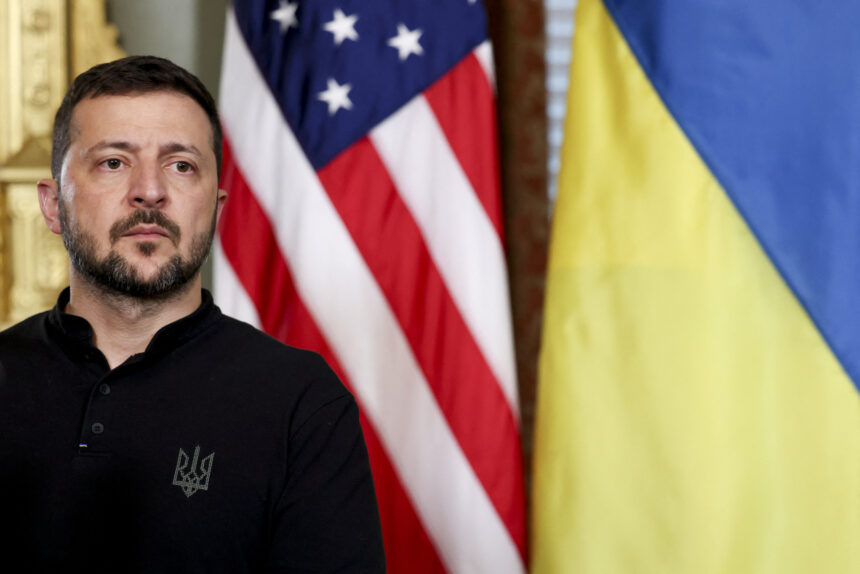As discussions about a potential peace plan intensify between Ukraine, Russia, and the United States, one issue remains immovable for Ukrainian President Volodymyr Zelensky: Crimea. While the Trump administration recently floated a plan recognizing Russian rule over Crimea in exchange for halting hostilities elsewhere, Kyiv responded with a firm and resounding rejection. For Zelensky, conceding Crimea is not merely a diplomatic decision—it’s a political impossibility grounded in Ukraine’s Constitution and national sentiment.

Why Crimea Is a Political Red Line
Russia’s annexation of Crimea in 2014 still reverberates deeply within Ukraine. The event remains a national trauma, with many Ukrainians viewing it as the ultimate betrayal and a blatant act of territorial theft. Any move to legitimize Russia’s control would not only violate Ukrainian law but would also be seen as a betrayal of the nation’s integrity and the people still living under Russian occupation.
“There is not a single Ukrainian politician who would vote to legalize the occupation of Ukrainian territories,” said Kostyantyn Yeliseyev, a former deputy chief of staff in the presidential administration. “For members of Parliament, it would be worse than political suicide.”
Trump Administration’s Proposal: A Clash of Agendas
The proposed U.S. peace initiative, spearheaded by the Trump administration, included the recognition of Russia’s sovereignty over Crimea and a ban on Ukraine’s NATO membership. In return, it offered a cease-fire along current front lines. While the idea of halting ongoing violence has appeal, the compromise on Crimea was a nonstarter for Kyiv.
Former President Trump expressed his dismay online, writing, “Crimea was lost years ago,” and implying Zelensky was risking more by holding onto what he considers a “pipe dream.” But for Ukrainians, this isn’t about fantasy—it’s about justice and sovereignty.
The Historical Context and Strategic Stakes
The annexation of Crimea began in 2014 when Russian troops, disguised in unmarked uniforms, swiftly took control of strategic locations. Although the seizure was largely bloodless, it ignited a broader conflict in eastern Ukraine that has since claimed over 14,000 lives and morphed into a full-scale war following Russia’s 2022 invasion.
Crimea’s population of approximately 2 million includes a significant number of Russian speakers and ethnic Russians. Despite historical ties, many in the international community, including the European Union and Turkey, continue to reject Russia’s claims to the region.
Crimean Tatars and Internal Opposition to Concession
One of the most vocal groups opposing any form of recognition is the Crimean Tatar community. Having faced repression under both Soviet and Russian rule, they fear that legitimizing the annexation would deepen their marginalization.
“Crimea is the homeland of the indigenous Crimean Tatar people and an integral part of Ukraine,” wrote Refat Chubarov, head of the Mejlis of the Crimean Tatar People. “No one — under any circumstances — can decide the fate of Crimea except the Ukrainian state and the Crimean Tatar people.”
Internally, Ukrainian leaders know that any concession on Crimea could be legally and politically disastrous. Officials recall that even signing a lease extension for a Russian naval base on the peninsula in 2010 led to later accusations of treason.
International Law and Precedents
Ukraine’s stance is not just domestic. It aligns with the principles of international law established post-World War II, which condemn the use of force to change borders. The United States’ own Crimea Declaration from 2018 reiterated this stance, comparing Crimea’s case to the Baltic states’ occupation under the Soviet Union.
“No Ukrainian president will ever have the authority to recognize Crimea as it was seized by force as part of Russia,” emphasized Oleksandra Matviichuk, a Nobel Peace Prize-winning Ukrainian human rights lawyer.
Conclusion: A Difficult Path Forward
While Zelensky’s position may frustrate some in the international community, it reflects a broader national consensus in Ukraine. The political cost of conceding Crimea is simply too high. Even if peace talks eventually yield a cease-fire on the battlefield, the question of Crimea remains a foundational issue that may prevent any lasting resolution.
As the war grinds on and global pressure to negotiate intensifies, Zelensky’s red line will likely remain unmovable, underscoring the enduring weight of history, sovereignty, and the struggle for justice in Ukraine’s national identity.
Category: International Politics, Ukraine Conflict, U.S. Foreign Policy, Eastern Europe
Tags: Volodymyr Zelensky, Crimea annexation, Trump peace plan Ukraine, Ukraine Russia conflict, Ukrainian sovereignty, Crimean Tatars, NATO Ukraine, Kyiv politics, U.S. Ukraine relations, post-Soviet conflicts









